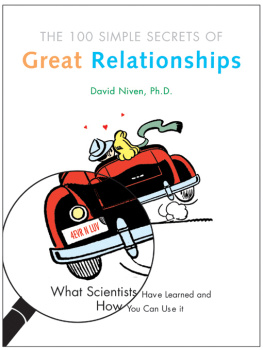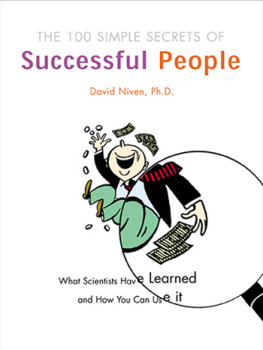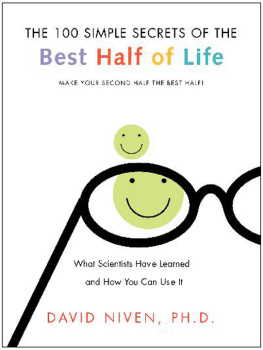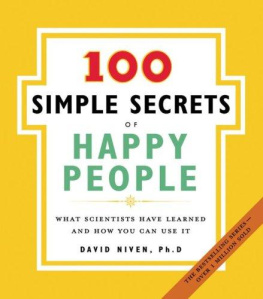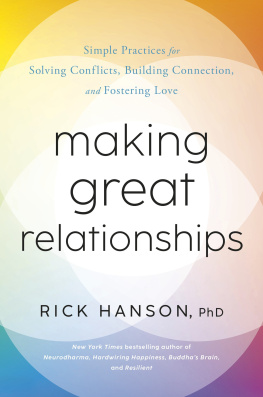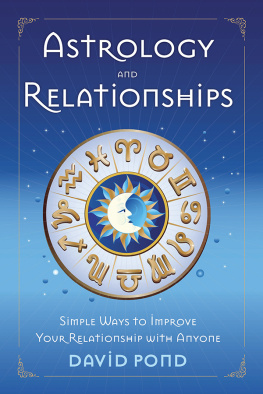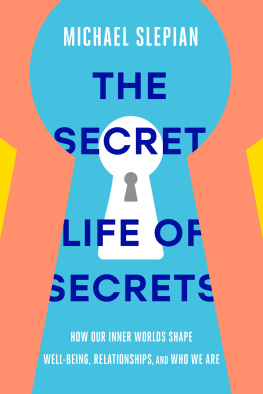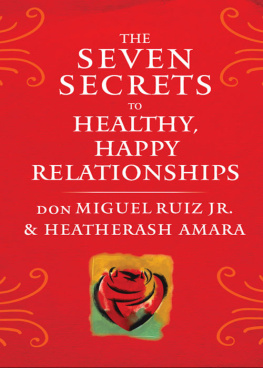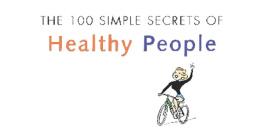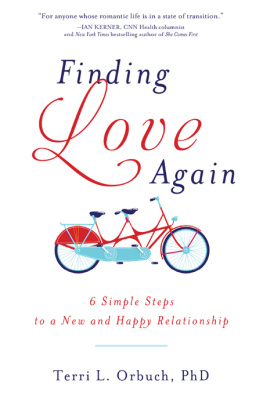The 100 SIMPLE SECRETS OF
Great Relationships
What Scientists Have Learned
and How You Can Use It
David Niven, Ph.D.

Contents
Each of the 100 entries presented here is based on the research conclusions of scientists studying relationships. Each entry contains a key research finding complemented by advice and an example following from the finding. The research conclusions presented in each entry are based on a meta-analysis of research on relationships, which means that each conclusion is derived from the work of multiple researchers studying the same topic. To enable the reader to find further information on each topic, a reference to a supporting study is included in each entry, and a bibliography of recent work on relationships has also been provided.
I was speaking to a group of senior citizens gathered in a community recreation center in Delray Beach, Florida. In the audience there must have been at least two dozen people who had been married for three decades or more. They had seen the full spectrum of relationshipsand heard the full spectrum of relationship advice. After my talk they asked what I was currently working on, and I mentioned I was studying research conclusions on relationships. Now the comments were flying in.
The seniors disagreed about a number of points, but they all nodded yes when one man said, Theres no topic out there with more bad advice. Well, maybe the stock market, but its up there. Top two, definitely. Stories came forward from couples married forty and fifty years about having been told by friends their marriage wouldnt last six months. Another said her mother told her on her wedding day she didnt think she would be married six weeks later.
There arent any songs about young people being encouraged by their friends and family to spend their lives togethertheyre all about warnings, one woman said. Its all how hard and terrible it will be. It will never last. Thats because relationships are the one thing everyone is a naysayer about when it comes to everybody elses situation.
Now, there wouldnt be any relationships if people applied this thinking to themselves. Personally, they have to be optimists. Of course things will work out. But with somebody else, its always, I dont know it will be tough. Are you sure youre ready?
While they shared a skepticism about bad adviceadvice that comes from people who are angry at the world or who want someone to commiserate withthey admitted they were apt to share their own views with their children, grandchildren, and sometimes just about anyone.
But their comments were generally spoken with an air of optimism and promise regarding their own relationshipsan optimism that was in stark contrast to the negative words they heard as younger men and women. Among the points they told me I should include in my book were
- Find a happy medium, which includes some time together and some time alone.
- Have patience, communication, and compromise.
- Talk out any problems that arise.
- Be unselfish.
- Have a strong work ethic, a sense of humor, and a love of family.
- Say Im sorry, thank you, and I forgot.
- Have mutual respect.
- Enjoy each others company.
- Work together for the true, the good, and the beautiful.
- Respect each others integrity, and understand differences.
- Show your appreciation for each other.
- Say, in sickness and in health, but never for lunch.
- Always say good night even if you are still upset about something.
While I explained that I would be working from the findings of scientific studies on relationships, the seniors told me I could come back anytime for more of their advice.
The 100 Simple Secrets of Great Relationships presents the conclusions of scientists who have studied the relationships, dating habits, and marriages of millions of people. Each entry presents the core scientific finding, a real-world example of the principle, and the basic advice you should follow to increase satisfaction with your personal life.
As I conducted the research for this book, combing through thousands of reports on relationships, I saw studies confirming many of the ideas the folks at the senior center had shared with me. And while the world around us has changed in innumerable ways since they were married, the core realities of human need for relationships and what humans need from relationships remain. And, in a great comfort to my friends at the senior center, these findings are not pessimistic. The great thrust of the research that has been done, and that I write about here, is completely in keeping with the wisdom of one of the gentlemen at the senior center, who said, It takes effort. It isnt easy. But anyone can do it. I mean, look at me, for example.
Some tasks we think of as difficult and their achievement noteworthy. Others we think of as boring and their achievement insignificant. Of course, the tasks that are noteworthy are often built on a foundation of the mundane. Firefighters study lifesaving techniques and firefighting protocols for years on end, and then one day they are called on to use their skills and knowledge to save a building and the people in it. Without the years of mundane commitment, there would be no moment of great achievement. We recognize that having a long-standing healthy relationship is an achievement. If you are married long enough, the local newspaper will take your picture and write up your story. But that achievement is built on a nearly infinite series of actions, including a daily, hourly, moment-to-moment commitment to each other. It is certainly not always easy, and the rewards are not always immediately apparent, but sacrificing your immediate preferences and being committed to sharing, caring, and listening are mundane but heroic steps toward your lifetime relationship goal.
Even before they dated, Kathy and William began working out together. Later, after they married, their interest and success in running led them to set a goal of running together in the Boston Marathon. After training for three years together working toward that goal, Kathys best time qualified her for the race and Williams did not.
William could have reacted in a variety of ways, all of them perfectly normal, given human nature. He could have wallowed in self-pity, dragging both himself and his wife down and making her feel somehow guilty for his exclusion. He could have asked Kathy to wait until they could run together. He could have resented his wifes ability to achieve and tried to sabotage her.
A big part of me wished I was out there running the marathon, of course, admitted William. So what did I do on race day? I went out to five or six locations and cheered her on. William chose to encourage rather than discourage. I lived vicariously through her. Her success is my success.
William says that in working out together, as in life together, jealousy, envy, and other unpleasant emotions can visit relationships, but the most important thing to remember is that were a team every dayrace day, too. We have to be able to give each other the freedom to be able to develop our own talents. To not stand in each others way, but to stand with each other, helping if we can, watching if we cant.
The ability to maintain open, healthy communication in a relationship is associated with strong levels of such highly regarded personal qualities as self-restraint, courage, generosity, commitment to justice, and good judgment.
Fowers 2001

